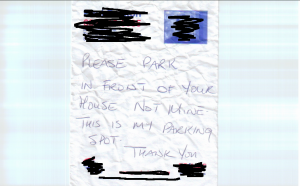
On or about Feb 21, 2009, a neighbour left a note on my windshield. Thus began a conversation between myself and said neighbour regarding the parking situation on our block. How will it all end?
About the note: I blacked out the real estate advertising, since it’s unrelated. People just use the free notepads we get around here. You’ll notice that the note is crumpled – my first reaction. I soon uncrumpled the note since a) I wanted someone else to see it so people would believe me, and b) I wanted to crumple it up again.
I later learned that our excellent downstairs neighbour had seen the note on my car, read it, and been totally shocked. He then told his SO/roommate, who related both of their shocked reactions to my sister.
My obsessive nature wouldn’t let me stop thinking about this, and various responses kept popping into my head. I thought of going out to the street at night and spray painting “Asshole parking only” in “his” parking spot. Allegra improved on that idea by suggesting we spray it using a stencil with Mandarin calligraphy (the neighbour would be able to read it, as would many others in the area, but the city probably wouldn’t notice). However, having had a run-in with the law for a related crime in my youth, I thought better of it.
Instead, I decided to write a letter to the neighbour. My goal was to get across my message without being too heavy, and with as much humour as I could muster. A writing exercise, I thought. I don’t have to actually deliver it. Here’s the result:
Dear neighbour —
It was with profound disappointment that I read the note you left recently on my windshield. Your arrogance, presumption, rudeness and general lack of neighbourliness astounds me.
I feel obliged to point out a few of the many ways in which your note was offensive and just plain wrong.
Parking on our block currently has no special legal designation and is simply a free-for-all. There are no special rules: anyone may park here at any time. If parking became an issue on our block, the city could be asked to designate it as RPO (Resident Parking Only), as was done for the 3300 block adjoining Rupert Street. While our block is not designated RPO, it is instructive to examine the rules for RPO, which is more restrictive than what we have now. From the City of Vancouver web site:
“Reserving” on-street parking spaces
Residents are reminded that they cannot “reserve” on-street parking spaces by placing buckets, cones, or other objects on the street. Debris left on city streets will be removed and disposed of by the City.
Resident Parking Only (RPO) Information
Where parking pressures from outside a residential block are great the Parking Management Branch would consider the installation of Residential Parking Only (RPO) signs to reduce the parking pressures on the street.
Criteria for Resident Parking Only (RPO) Zones
If the parking problem cannot be solved by enforcement of the 3-hour by-law, an RPO zone may be installed if the following criteria are met:
1. The parking problem occurs in a one or two family zoned residential dwelling district.
2. The on-street parking density on the block is at or near 100% during problem times.
3. The problem is caused by non-residents and occurs at least twice a week.
4. Some households on the block do not have any off-street parking spaces. An RPO zone may not be warranted if the residents requesting it have adequate off-street parking or are using their off-street parking for other purposes.
5. The RPO zone must be supported by a petition signed by residents of all of the households on the block, with 67% signing in favour of the RPO regulations.
The RPO zone is generally installed to reserve 30%-50% of the parking for residents of the block. Any resident of the block referred to on the RPO signs may use the zone to park their vehicle(s). Residents are encouraged to cooperate with each other in how they use and enforce the zone. Enforcement is on a complaint basis only by phoning Parking Enforcement.
I have added emphasis to three sections in the excerpts above, to draw your attention to the following points:
Residents are reminded that they cannot “reserve” on-street parking spaces
This statement speaks for itself and, in itself, utterly destroys any claim you have to a specific parking space on the street.
Some households on the block do not have any off-street parking spaces.
The household in which I reside falls into this category. We do not have access to the property on which we live, for the purpose of parking. The garage is not available to us, nor is the yard or the alley, as these are already in use by the landlord and other tenants. That leaves the street. In our household, we have two people, but only one car. Since there is room for two cars on the street directly in front of our residence, we should always be able to park there. However, some people on this block have more than one vehicle, so parking on the street is sometimes hard to find. When this occurs, I am forced to find a spot somewhere other than directly in front of our residence. I understand this and am willing to do a small amount of extra walking in the interest of cooperation with my neighbours. Which brings me to:
Residents are encouraged to cooperate with each other in how they use and enforce the zone.
The clear implication of this statement is that if the city finds that people on a block using RPO street parking are unable to cooperate, the next step is to start issuing permits. Personally, I would not like to see this happen. I would much rather work with my neighbours voluntarily than be forced into an arrangement by the government. Perhaps you feel differently.
Again, our block is not RPO, but it seems clear that in a less restrictive system than RPO, such as the free-for-all we have now, residents are even less entitled to any particular parking spot.
My surprise on reading your note was due in no small part to an observation that if you are forced to park somewhere other than directly in front of your house, for example in front of my house, the entire inconvenience this presents to you is about 20 feet of extra walking to and from your car. If this is too much of a sacrifice to make in the name of neighbourliness, then perhaps you should not be living in such close proximity to other people.
Another observation that makes your note even more troubling is that, besides the two street spots in front of your house, you have space on and adjoining your property for parking no fewer than six cars. First, you have a two car garage. Second, your back yard is essentially a concrete parking lot, with a gate that was clearly designed to allow passage of automobiles, allowing at least two cars to park there. Third, you have room to park two more cars in the alley adjoining your property. I, on the other hand, have access only to street parking, as I mentioned above. To insist that you are entitled to a specific street parking spot when you have all this additional parking available to you alone, seems to me grasping, greedy and unfriendly in the extreme.
Do you think I park in front of your house to annoy you? Or do you believe that I don’t care about getting along with my neighbours? If so, you are wrong. I only park in front of your house when it proves necessary, when there are no available spots in front of my own residence. Why would I park anywhere else if I had a choice? In fact, I have absolutely no desire to park in front of your house, since a tree partially overhangs those spots and birds frequent that tree. When I park there, my car often ends up covered in bird droppings. So there’s nothing I would like better than for you to park your car there whenever possible.
Perhaps your note was prompted by the fact that sometimes my car doesn’t move for days at a time. Perhaps you would like me to constantly monitor the street and move my car to the front of my house the moment a spot becomes available. Perhaps you would like even more unreasonable things. Who knows?
Despite all of this, I would have been willing, in the spirit of neighbourly cooperation, to go out of my way to avoid parking in front of your house, if the tone of your note was more reasonable and friendly. Here’s an example of the kind of note you should have left, always assuming that you understood all of the above and still felt you should be allowed to park in front of your house to the exclusion of all other people:
Dear neighbour —
I realize that this may seem somewhat presumptuous, but I would very much like to park in front of my house whenever possible. I notice that your car is sometimes parked there for extended periods. I am [elderly/ill/easily lost/physically challenged/lazy] and find the extra walking too much to bear. If you could possibly avoid parking in front of my house in the future, I would be very grateful.
Sincerely,
Your neighbour.
In closing, I would like to point out that you should not expect us to be particularly neighbourly toward you in the future, now that your own feelings are clear. Your note was in stark contrast to our previously positive neighbourly feelings toward you, when we cleared a walkway out to that parking space for you during the big snowfall we had last December. If you want to re-establish good relations, an apology would be a great start.
Sincerely,
Your neighbours at 3581 East 23rd Ave. (main floor)
I had Allegra check it, and she added the last part about her shoveling a path to their car. I then thought about it for a couple more days and decided that even if the neighbour didn’t like it, he had less cause for complaint than I did for the original note. So I delivered it on Feb 26, 2009, as reported in Allegra’s blog.
So far, no response.
August 8 2009 update…
Gosh, I am SO HAPPY we don’t live there any more. Allegra
